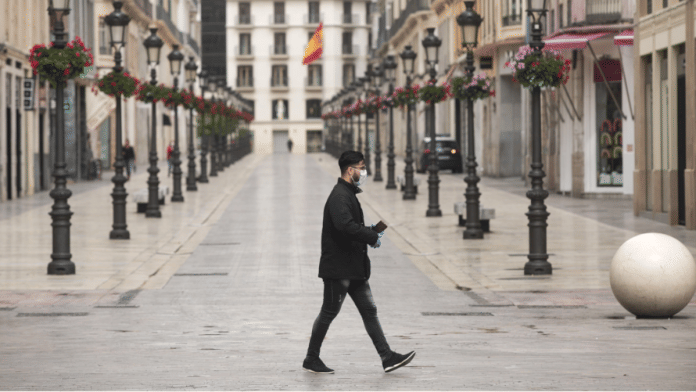Berlin: Europe’s battle to check a dramatic surge in coronavirus infections is entering its next phase, with the continent’s two powerhouse economies clamping down on movement for at least a month while trying to limit the impact on business activity.
Germany will begin a partial shutdown Monday, with bars, restaurants, leisure facilities and cultural venues closed, while schools and most shops remain open. France started its version of “lockdown lite” on Friday, part of a series of tighter measures imposed by governments across Europe, where more than 215,000 people have died from the disease and nearly 7 million have been infected. The U.K. is also mulling new lockdown measures with cases rising at record rates.
With protests multiplying and political unity fraying, officials are hoping they can bring the disease back under control as Europe heads into the winter, allowing them to avoid the sweeping restrictions that plunged the continent into recession in the spring.
Here’s the latest in Germany, Britain, France, Italy and Spain:
Germany
After talks Wednesday with the country’s 16 regional premiers, Chancellor Angela Merkel announced measures to severely limit movement, while keeping schools open and the economy ticking over.
Merkel said that the country is in a “dramatic situation,” with health-care services stretched close to the limit and authorities no longer able to track infections back to their source.
If Germany waits until intensive care units are full, it will be too late, she said, warning of “four long and difficult winter months” ahead.
More than 19,000 new cases were reported on Friday, the second-highest daily number yet.
Officials insist the latest steps will broadly allow Europe’s biggest economy to continue to function, and Economy Minister Peter Altmaier said Friday the government still expects growth of 0.4% in the fourth quarter.
Merkel is struggling to retain control over the crisis. An address she made Thursday in parliament was repeatedly interrupted by heckling from opposition lawmakers as she condemned “lies and disinformation, conspiracy and hate.”
Britain
Boris Johnson’s government is mulling new national restrictions from next week with the government ready to abandon its plan to tackle localized coronavirus hot spots rather than impose a nationwide lockdown. Johnson is now weighing a one-month stay-at-home order that could be announced on Monday, with an exemption for schools and universities, the BBC reported.
Johnson may have been swayed by new data seen by the BBC showing that the death toll could go as high as 4,000 a day if stricter policies aren’t brought in to slow the spread. That’s about four times the daily death rate at the first peak of the virus. Another report by the government’s scientific advisory panel on the virus released Friday indicated that the outbreak in the U.K. was already tracking a steeper trajectory than even the government’s worst-case scenario.
Cases in the U.K. jumped by more than 24,000 on Friday and total infections will likely exceed 1 million as soon as Saturday.
France
France’s goal is to limit the economic contraction to 15% during the latest lockdown, about half of the 30% decline during the one that started in March, according to Finance Minister Bruno Le Maire.
That was caused in particular by a halt to construction work, while this time building sites and stores selling building materials will remain open, as well as government services handling permits.
The announcement of the new curbs came less than a week after France expanded a curfew to about two-thirds of the population. “Virus is circulating in France at a speed that even the most pessimistic forecast didn’t foresee,” President Emmanuel Macron said Wednesday in an address to the nation.
On Friday, France reported the most new deaths since April 20, the same day the first lockdown went into effect.
Italy
Prime Minister Giuseppe Conte’s cabinet is not expected to make any decisions on possible new restrictions until next week, as the premier insists more time is needed to assess the efficacy of the most recent measures in the original epicenter of the pandemic on the continent.
A next round of restrictions could involve targeted shutdowns of entire urban areas, possibly including hard-hit Milan and Naples, local media have reported. The country could still go into a near-full lockdown as soon as Nov. 9 if infection figures continue spiking, according to daily Il Messaggero.
Italy has already set an 11 p.m. curfew, curtailed operating hours for restaurants and bars, and shut down gyms, swimming pools and entertainment venues.
Reported new cases exceeded 30,000 on Friday for the first time since the pandemic began.
Spain
A majority of Spain’s 17 regions have already closed their domestic borders or will do so this week, preventing non-essential travel.
Targeted regional lockdowns will remain in force until after Nov. 9, and cover consecutive bank-holiday weekends, which would typically lead to massive flows of travelers moving across the country.
Regional authorities have extraordinary powers to declare curbs on movement after Prime Minister Pedro Sanchez announced a state of emergency on Oct. 25. Spain this week reported more than 9,000 daily coronavirus infections on two consecutive days, the most since tracking started. –Bloomberg
Also read: Europe is losing the fight to keep economy open as virus spreads






